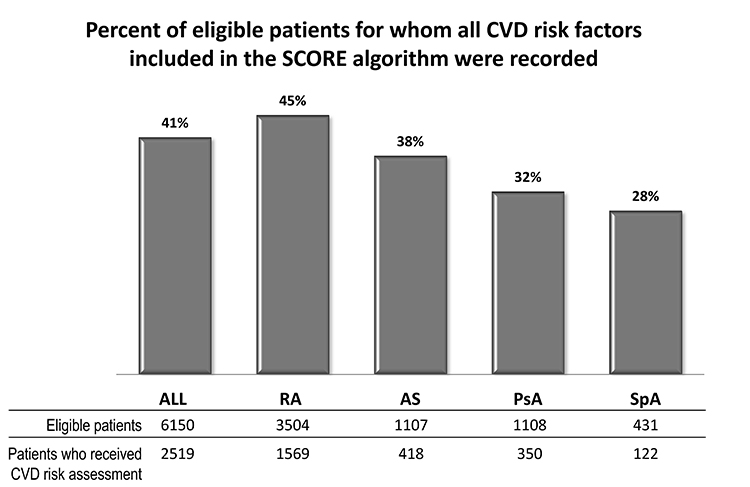Session Information
Date: Sunday, November 13, 2016
Title: Health Services Research I: Workforce and Quality of Care in Rheumatology
Session Type: ACR Concurrent Abstract Session
Session Time: 2:30PM-4:00PM
Background/Purpose:
The EULAR recommendations for cardiovascular disease (CVD) risk management in patients with inflammatory joint diseases (IJD) states that CVD risk assessment should be considered annually in this patient population, and emphasizes that such assessment can be easily incorporated into a routine rheumatology visit; but they are rarely implemented. The aim of the NOrwegian Collaboration on Atherosclerosis in patients with Rheumatic joint diseases (NOCAR) was to design a program of annual CVD risk assessment for IJD patients that could be implemented into routine visits in rheumatology outpatient clinics.Methods:
NOCAR was started in April 2014 for quality assurance purposes, and comprises 11 rheumatology centres across Norway. All IJD patients >30 years registered in the electronic patient journal program GoTreatIt® Rheuma (GTI) are eligible. The CVD risk factors recorded in NOCAR are imputed directly into the GTI journal and are collected in a multidisciplinary manner: 1) Patients self-report CVD risk factors, 2) non-fasting lipids are ordered by health secretaries in addition to routine laboratory tests and 3) rheumatology nurses perform blood pressure measurement. Based on the Systematic COronary Risk Evaluation (SCORE) algorithm, GTI automatically calculates the patient’s 10-year risk of a fatal CVD event. If the SCORE estimate is ≥5%, the rheumatologist forwards a note to the patient’s primary physician to inform that there is indication for initiation of CVD-preventive measures (e.g. medication and lifestyle changes). Additionally, the rheumatologists and rheumatology nurses are instructed in how to deliver brief advice regarding smoking cessation and healthy diet. We report the initial capture rate in 3 NOCAR centres from which visit data was extracted in October 2015. We evaluated how many of the eligible patients who had received a CVD risk evaluation during these first 1.5 years of the NOCAR project. A CVD risk assessment was defined as having recoded all of the CVD risk factors included in the SCORE algorithm (total cholesterol, systolic blood pressure, smoking status, age and sex).
Results:
Of the 6150 IJD patients (Rheumatoid arthritis [RA]: 3504, ankylosing spondylitis [AS]: 1107, psoriatic arthritis [PsA]: 1108, and other spondyloarthritides [SpA]: 431) who were eligible for the NOCAR project, 2519 (41%) patients received a CVD risk assessment during this 1.5 year interval (RA: 1569 [45%]), AS: 418 [38%], PsA: 350 [32%], SpA: 122 [28%]). The major obstacles to successful implementation encountered in NOCAR were time scarcity; defining a date for annual CVD risk assessment and making sure that lipids were measured before seeing the rheumatologist.Conclusion: To our knowledge, this is the first multi-centre clinical project to show that incorporation of CVD risk assessment into routine rheumatology visits is feasible.
Disclosure: E. Ikdahl, None; S. Rollefstad, None; G. Wibetoe, None; A. Salberg, None; D. M. Soldal, None; I. C. Olsen, None; T. K. Kvien, None; G. Haugeberg, Go Treat IT, 4; A. G. Semb, None.
To cite this abstract in AMA style:
Ikdahl E, Rollefstad S, Wibetoe G, Salberg A, Soldal DM, Olsen IC, Kvien TK, Haugeberg G, Semb AG. How to Implement Cardiovascular Disease Risk Assessment for Patients with Inflammatory Joint Diseases in Daily Rheumatology Practice: An Overview of a Nationwide Norwegian Project [abstract]. Arthritis Rheumatol. 2016; 68 (suppl 10). https://acrabstracts.org/abstract/how-to-implement-cardiovascular-disease-risk-assessment-for-patients-with-inflammatory-joint-diseases-in-daily-rheumatology-practice-an-overview-of-a-nationwide-norwegian-project/. Accessed .« Back to 2016 ACR/ARHP Annual Meeting
ACR Meeting Abstracts - https://acrabstracts.org/abstract/how-to-implement-cardiovascular-disease-risk-assessment-for-patients-with-inflammatory-joint-diseases-in-daily-rheumatology-practice-an-overview-of-a-nationwide-norwegian-project/
